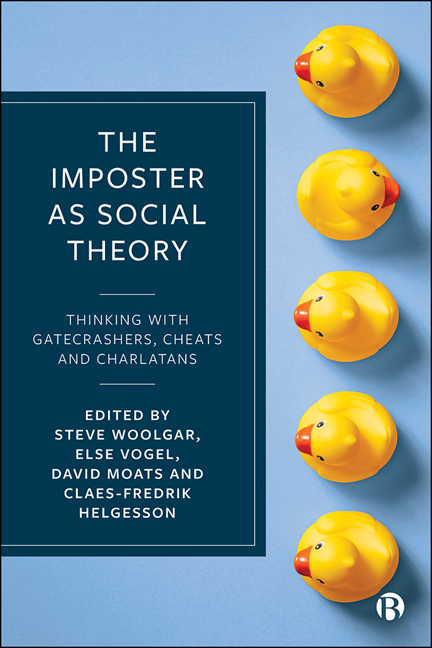Book contents
- Frontmatter
- Contents
- List of Figures and Boxes
- Notes on Contributors
- Preface
- 1 Thinking with Imposters: The Imposter as Analytic
- 2 The Desire to Believe and Belong: Wannabes and Their Audience in a North American Cultural Context
- 3 A Menagerie of Imposters and Truth-Tellers: Diederik Stapel and the Crisis in Psychology
- 4 Learning from Fakes: A Relational Approach
- 5 Imitations of Celebrity
- 6 Natural Imposters? A Cuckoo View of Social Relations
- 7 Conjuring Imposters: The Extraordinary Illusions of Mundanity
- 8 States of Imposture: Scroungerphobia and the Choreography of Suspicion
- 9 The Face of ‘the Other ’: Biometric Facial Recognition, Imposters and the Art of Outplaying Them
- 10 Faking Spirit Possession: Creating ‘Epistemic Murk ’ in Bahian Candomblé
- 11 The Guerrilla’s ID Card: Flatland against Fatland in Colombia
- 12 Good Enough Imposters: The Market for Instagram Followers in Indonesia and Beyond
- 13 Thinking beyond the Imposter: Gatecrashing Un/Welcoming Borders
- 14 Postscript: Thinking with Imposters – What Were They Thinking?
- Index
14 - Postscript: Thinking with Imposters – What Were They Thinking?
Published online by Cambridge University Press: 22 December 2021
- Frontmatter
- Contents
- List of Figures and Boxes
- Notes on Contributors
- Preface
- 1 Thinking with Imposters: The Imposter as Analytic
- 2 The Desire to Believe and Belong: Wannabes and Their Audience in a North American Cultural Context
- 3 A Menagerie of Imposters and Truth-Tellers: Diederik Stapel and the Crisis in Psychology
- 4 Learning from Fakes: A Relational Approach
- 5 Imitations of Celebrity
- 6 Natural Imposters? A Cuckoo View of Social Relations
- 7 Conjuring Imposters: The Extraordinary Illusions of Mundanity
- 8 States of Imposture: Scroungerphobia and the Choreography of Suspicion
- 9 The Face of ‘the Other ’: Biometric Facial Recognition, Imposters and the Art of Outplaying Them
- 10 Faking Spirit Possession: Creating ‘Epistemic Murk ’ in Bahian Candomblé
- 11 The Guerrilla’s ID Card: Flatland against Fatland in Colombia
- 12 Good Enough Imposters: The Market for Instagram Followers in Indonesia and Beyond
- 13 Thinking beyond the Imposter: Gatecrashing Un/Welcoming Borders
- 14 Postscript: Thinking with Imposters – What Were They Thinking?
- Index
Summary
So, that's it.
Yes, all done.
Great book!
Yes, absolutely.
Full of wonderful, rich examples.
Yes. Which were your favourites?
I loved learning from fakes, and the Ku Klux Klan guy, and epistemic murk …
… the welfare cheats, the good enough Instagram followers, and the conjuring …
Wasn't that cool, how the magician …
… the conjuror …
Ah yes, sorry, the conjuror. How the conjuror drew parallels between the art of conjuring and the craft of academic writing.
Yes. A great demonstration of the effective use of dialogue to bring complex arguments to life.
Clever!
I especially like that the editors commissioned expert imposters to write the Postscript, rather than the usual choice of a prestigious academic.
Yes, nice touch.
A welcome alternative to inviting a Big Name who then largely ignores the preceding chapters and proposes some grand theory based on personal anecdote.
Good to avoid that.
Mind you, I do think the collection seems hardly to scratch the surface of the whole imposter phenomenon. I mean, there are no focused case studies of undercover policing, the imposter syndrome …
It's interesting though isn't it, that as soon as one person mentions the term imposter, someone else feels obliged to provide yet more examples of the category. It's as if the very term ‘imposter’ has some kind of intrinsic capacity to generate more examples of itself.
… professional actors, trompe l’oeil illusions, fake composers …
Fake composers?
‘Albinoni’s’ Adagio in G minor, for example?
Oh, OK.
… the Australian lyrebird, spies …
Have you already forgotten that the whole volume began with the Russian spies?
With possible Russian spies.
OK, yes, possible spies. Or tourists.
And what about all those related figures and perspectives, didn't one of the reviewers of the original book proposal mention some of them: the anansi spider (Hylland Eriksen, 2013), the coyote trickster (Haraway, 1991), agnotology (Proctor and Schjebinger, 2008) …?
Yes, and I noticed that despite its catchy subtitle, the book says little specifically about gatecrashers and charlatans.
But they couldn't include every imaginable empirical example of imposters, could they? The book would have been massive! And that's the point isn't it. Imposters are everywhere. The examples in the book are just a taster of an apparently limitless phenomenon. Without wishing to sound like its own back cover endorsement, this book now opens up a whole new field of imposter studies.
Information
- Type
- Chapter
- Information
- The Imposter as Social TheoryThinking with Gatecrashers, Cheats and Charlatans, pp. 317 - 328Publisher: Bristol University PressPrint publication year: 2021
